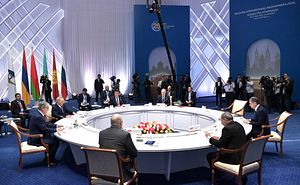Following the summit of the Eurasian Economic Union (EAEU) in Nur-Sultan this past May, Russian President Vladimir Putin announced that an agreement to ensure equal pension rights for labor migrants from the EAEU countries, which include Russia, Belarus, Armenia, Kyrgyzstan, and Kazakhstan, is in its final stage of preparation. This agreement aims to remove an important obstacle and resolve a legitimate concern for both high and low skilled labor migrants.
The unresolved issue of the payment of pension contributions and the export of pensions has been one of the main impediments to the free movement of labor within the EAEU space. At present, each member state has its own legislation regarding the formation of pension rights, which entails contributions to the pension system of the state of employment. However, in order to receive a pension, in most cases, one has to have a permanent residence or citizenship in the state of employment, be employed on the territory of the country for a specific number of years, reach a certain age, and meet a number of other requirements. Moreover, in cases where there is no treaty between countries, work experience accumulated in other countries is not counted. Formation of pension rights for incoming workers from other member states is not foreseen in Kazakhstan and Kyrgyzstan. In the case of Armenia, the formation of pension rights is on the docket; however, the export of pensions is virtually impossible. In Russia, currently, labor migrants from the EAEU make contributions to the Pension Fund; however, they are not entitled to pensions once they retire. Pension contributions also vary significantly among EAEU member states. Workers in Russia contribute 22 percent of their salaries, whereas their counterparts in Belarus and Kazakhstan contribute 29 and 10 percent, respectively.
The new agreement foresees that pensions will be paid regardless of the EAEU country in which the pensioner lives. In other words, pensions will be paid regardless of whether the pensioner lives in the country of his permanent residence or in the country that entitled him to the pension. Work experience acquired in other EAEU countries will be counted under the new agreement. Thus, a Russian pensioner who moved to another EAEU country after retirement will continue receiving his pension from Russia. Similarly, a labor migrant from Kyrgyzstan who worked in Russia and contributed to the Pension Fund would be entitled to payments in the future (even after he returns to Kyrgyzstan). One important caveat is that only legal labor migrants who take jobs with employment or civil law contracts will have pension rights. Currently, as noted above, labor migrants in Russia do make contributions to the Pension Fund, but it remains unclear to anybody how that money is being spent. Labor migrants will be able to count only those contributions that will be made after the agreement officially comes into force.
Given that the agreement is planned to be signed in September 2019, the first payments will proceed no earlier than 2020. The current estimate is that the Russian Pension Fund will have to pay 75 million rubles (about $1.17 million) in 2020-2021 to citizens of Kazakhstan, Kyrgyzstan, Belarus, and Armenia, in addition to 91 million rubles to Russian citizens in EAEU member states. However, whether the Pension Fund will actually make those payments is a fair question. The Pension Fund has been running a deficit for many years. During the last decade, the federal budget covered at least one-third of the Pension Fund’s expenditure, which ranged from $28 to $59 billion on an annual basis. The persistent deficit in the Pension Fund, which was taking one-fifth of the federal budget, was one of the main reasons behind last year’s highly unpopular pension reforms in Russia. Pension contributions under the new agreement will add another layer of expenditure that the Russian Pension Fund will have to cope with.
Another question is who will ensure the protection of pensions rights for labor migrants. The institutions of the EAEU are clearly not as strong and independent as those of the European Union, upon which they are modeled. In contrast to the European Commission, the EAEU Commission cannot take a non-complying country to the Court of the Eurasian Economic Union in Minsk. The weakness of the Commission was evident during trade wars between member states when Belarus re-established internal customs border controls. Then-President of Kyrgyzstan Almazbek Atambayev harshly criticized the Eurasian Commission for failing to take action against Kazakhstan when then-President Nursultan Nazarbayev restricted the free flow of goods by putting in place border checks and banning certain Kyrgyz products in 2017. Taking into account the Commission’s failure on several occasions to ensure member states’ compliance with the EAEU’s regulations, its ability to resolve disputes in such a contentious domain as payment of pensions is dubious.
Khamza Sharifzoda is a graduate student at Georgetown University. He specializes in the politics and governance of Russia, Turkey, and Eurasia.

































